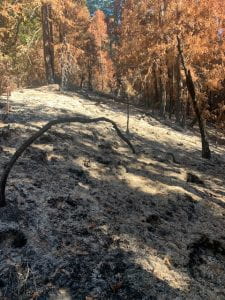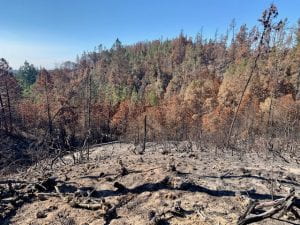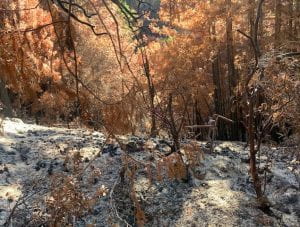Christina was awarded an NSF RAPID grant to study “The impact of headwater wildfire burns on the export of materials to the coast.”
 Small watersheds (<1000 km2) comprise nearly 1/5 of all land on Earth and the majority of watersheds along the California coastline. While these systems are globally ubiquitous, comprehensive hydrological and biogeochemical data for these small systems is limited, and even less is known about how these coastal systems respond to wildfires. To fill this knowledge gap, investigators propose to examine near-term wildfire impacts on coastal stream water material exports to better understand how fire can alter material sourcing, composition, and concentrations across dynamic flow regimes. They will focus on stream water particulate and dissolved carbon (C) and nitrogen (N) compounds as they are fundamentally important to local food webs and drinking water quality. Specifically, they propose to: (1) leverage paired watersheds with varying biophysical watershed characteristics to better understand differences in water quality responses post-fire, and (2) use multiple lines of evidence (stable isotopes, optical properties, C and N ratios), and direct quantification of pyrogenic C to differentiate contributions from burn affected and unburned regions of each watershed. This study will provide new insight into how coastal stream C and N sources, composition, and exports vary across flows in response to wildfire. This insight is critical to better understanding how wildfire can alter C and N sources, transport, and fate in coastal draining systems.
Small watersheds (<1000 km2) comprise nearly 1/5 of all land on Earth and the majority of watersheds along the California coastline. While these systems are globally ubiquitous, comprehensive hydrological and biogeochemical data for these small systems is limited, and even less is known about how these coastal systems respond to wildfires. To fill this knowledge gap, investigators propose to examine near-term wildfire impacts on coastal stream water material exports to better understand how fire can alter material sourcing, composition, and concentrations across dynamic flow regimes. They will focus on stream water particulate and dissolved carbon (C) and nitrogen (N) compounds as they are fundamentally important to local food webs and drinking water quality. Specifically, they propose to: (1) leverage paired watersheds with varying biophysical watershed characteristics to better understand differences in water quality responses post-fire, and (2) use multiple lines of evidence (stable isotopes, optical properties, C and N ratios), and direct quantification of pyrogenic C to differentiate contributions from burn affected and unburned regions of each watershed. This study will provide new insight into how coastal stream C and N sources, composition, and exports vary across flows in response to wildfire. This insight is critical to better understanding how wildfire can alter C and N sources, transport, and fate in coastal draining systems.

